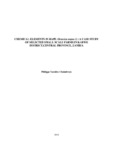Abstract:
A case study was carried out to investigate the concentration levels of chemical elements in different varieties of rape (Brassica napus L.) which were grown in five farms in Chowampanga, Kabwe district in Zambia. The purpose of the study was to monitor the levels of chemicals in locally grown vegetables in order to assist in achieving public health objectives of food safety and nutrition. The main objectives was to investigate the composition and concentration levels of chemical elements present in rape samples. In the farming season January to May 2018, 25 rape leaves were collected for plant tissue testing using Scanning Electron Microscopy. The results of the analysis showed the presence of 11chemical elements namely Nitrogen, Chlorine, Phosphorus, Sulphur, Aluminium, Calcium, Potassium, Magnesium, Silicon, Tellurium and Rubidium in most rape leaves. The concentration levels of chemical elements in the rape leaves were significantly different and characterised by higher levels of macro than micro nutrients and non-essential chemical elements, some which exceeded the Recommended Dietary Allowances. The rape leaves sampled from all the selected farms were therefore considered to be safe, valuable and important contributors to the diets of the people in Kabwe especially among the marginal income populations.
